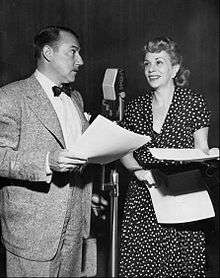Granby's Green Acres
Granby's Green Acres is a radio situation comedy from the United States. It was broadcast on CBS July 3, 1950 – August 21, 1950,[1] as a summer replacement for Lux Radio Theatre.[2]
 Gale Gordon and Bea Benaderet in 1950 | |
| Genre | Situation comedy |
|---|---|
| Running time | 30 minutes |
| Country of origin | United States |
| Language(s) | English |
| Syndicates | CBS |
| TV adaptations | Green Acres |
| Starring | Gale Gordon Bea Benaderet |
| Announcer | Bob LeMond |
| Written by | Jay Sommers |
| Directed by | Jay Sommers |
| Produced by | Jay Sommers |
| Original release | July 3, 1950 – August 21, 1950 |
| Opening theme | Old MacDonald Had a Farm |
Premise
Granby's Green Acres featured a former banker "who knew little about farming and proved it every week."[2]
Characters and Cast
Three of the main characters on Granby's Green Acres were much like those heard on many other situation comedies on radio: a husband, his "somewhat addled and impractical" wife, and "their breathless teenage daughter."[3] Radio historian John Dunning wrote that the husband and wife were "inspired by characters heard on the Lucille Ball show, My Favorite Husband."[3] In fact, radio regulars Gale Gordon and Bea Benaderet (who played John and Martha Granby) also played Mr. and Mrs. Atterbury on My Favorite Husband.[3] Dunning noted, "The names were changed, but the basic characters remained the same."[1]
Granby's Green Acres was Benaderet's "one and only full-fledged starring role on radio."[4] Two other regulars were also familiar to radio listeners. Louise Erickson played Janice, the Granbys' daughter, and Parley Baer played Eb, the farm's hired hand.[5] The storekeeper, Will Kimble, was played by Howard McNear in the first episode and by Horace Murphy in subsequent broadcasts.[2]
Bob LeMond was the announcer, and Opie Cates was the music director.[1]
Television adaptation
Although Granby's Green Acres was not transferred directly to television, as were many old-time radio programs, it was the inspiration for Green Acres. The television program followed two popular programs (The Beverly Hillbillies and Petticoat Junction) produced by Paul Henning, as Jeffrey Westhoff explained:
CBS asked Henning to create a third show. To avoid the stress of running three shows at once, Henning asked Petticoat writer Jay Sommers to create and produce this new program. Sommers proposed reviving Granby's Green Acres, changing the farmer's name and shortening the title.This meant that Benaderet's old radio show had become a spinoff of her television show.[4]
History
The show's creator, Jay Sommers, based its concept on memories of time he spent as a boy on a farm near Greendale, New York. His stepfather went broke trying to make the farm successful.[6] In 1948, Granby's Green Acres was auditioned for a slot on ABC with Hanley Stafford originally set to star.[7] Of the eight episodes that aired, five remain in existence, as does the unaired pilot episode.
See also
References
- Dunning, John (1998). On the Air: The Encyclopedia of Old-Time Radio (Revised ed.). New York, NY: Oxford University Press. p. 289. ISBN 978-0-19-507678-3. Retrieved 2019-08-20.
- Schulz, Clair (Spring 2009). "Forgotten Shows to Remember". Nostalgia Digest. 35 (2): 18–22.
- Dunning, John. (1976). Tune in Yesterday: The Ultimate Encyclopedia of Old-Time Radio, 1925-1976. Prentice-Hall, Inc. ISBN 0-13-932616-2. P. 244.
- Westhoff, Jeffrey (Winter 2014). "From A to Bea". Nostalgia Digest. 40 (1): 42–48.
- Terrace, Vincent (1981), Radio's Golden Years: The Encyclopedia of Radio Programs 1930-1960. A.S. Barnes & Company, Inc. ISBN 0-498-02393-1. P. 105.
- Thomas, Bob (October 23, 1966). "'Corn' Often Preferred". The Baytown Sun. p. 3. Retrieved July 8, 2015 – via Newspapers.com.

- "Main Street" (PDF). Radio Daily. November 1, 1948. p. 4. Retrieved 10 July 2015.